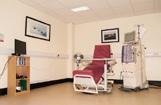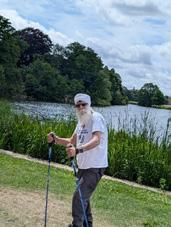
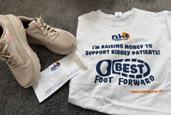

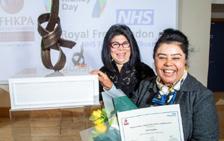
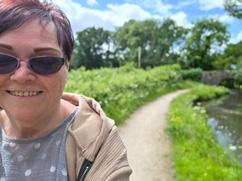
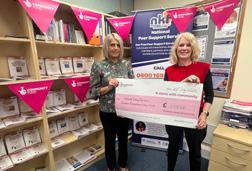
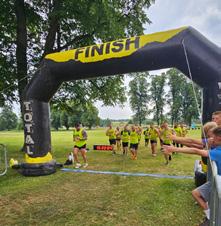
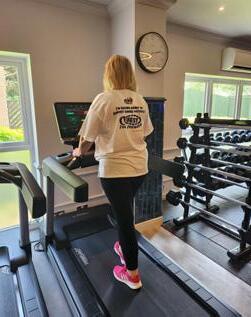
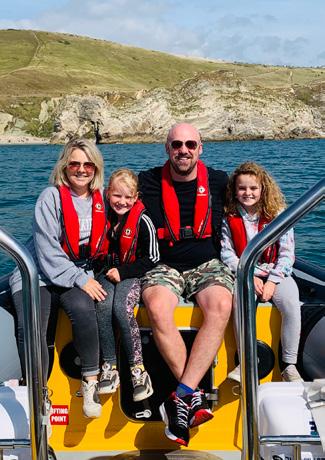












As well as soaking up the sunshine this summer, we’ve got plenty to celebrate in this issue of Kidney Life.
At the heart of it all - as ever - are the people. This edition is packed with powerful patient stories, incredible fundraising efforts, and moments of pure inspiration. From everyday heroes to record-breakers and award winners, our community continues to impress with its strength, passion, and determination.
And while we’re (hopefully) still enjoying those long sunny days in August, you’ll also find a little nudge to start thinking about Christmas - yes, already! We’ve listened to your feedback and brought back the paper version of the Christmas Draw. You’ll find tickets enclosed, along with some festive fundraising goodies that are ready to order now.
Don’t forget to book your spot at our Annual Event in October. I’ll be there and I’d love to see you.
Until then, enjoy this issue and, as always, I welcome your thoughts and feedback.
Warm wishes,
Annie Taylor Editor
kidneylife@kidney.org.uk
NKF OFFICERS
Chairman – David Coyle
Co Vice Chair – Caryl Bryant
Co Vice Chair – Tarsem Paul
Secretary – Brian Child
NKF TEAM
Andrea Brown – Chief Executive
Pete Revell – Head of Marketing & Fundraising
Donna Blizard – Office Manager
Sharney Warren – Communications and Marketing Officer
Fiona Broomhead – Senior Office Administrator
Joe Rutter – Social Media and Website Coordinator
Lucy Vasiliou - Policy and Public Affairs Manager
Heather Mooney – Accounts Administrator
Chris Talbot – Membership Development Lead
Linda Pickering – Helpline Advisor
Stephen Emmerson – Helpline Advisor and Peer
Support Coordinator
It’s always lovely to surprise someone and that’s what we did last month when we contacted Peter to tell him he’d won the draw from the reader survey in the last issue of Kidney Life.
Peter from Sutton Coldfield told us “Well what a surprise, I've never won anything before! I’ve decided to buy some music with the prize. I’m a big fan of all, well most genres classical to modern, and I recently discovered a young talent on YouTube - Tom King. His rendition of The Door was what hooked me. So, he has just released an EP and has a couple of singles available, so I will purchase them with the voucher. Thank you, I shall think of you all when I play them.”
Our thanks to you and to everyone who took part in the reader survey. We hope you enjoy your new music, Peter.
The NKF is pleased to announce that we’ve been awarded a grant of £19,019 by the National Lottery Community Fund to expand our Peer Support Service. The funding will allow the NKF to connect even more kidney patients, carers, and families with trained peer support volunteers who have firsthand experience of kidney disease. Thanks to this funding, the Peer Support Service will continue to extend its reach across the UK, providing vital guidance and emotional support to those navigating diagnosis and treatment. At the same time, the NKF will continue its work raising awareness of early kidney disease detection through community outreach and stronger links with local GPs, helping more people access their services.
Andrea Brown, NKF Chief Executive said; “We’re delighted that The National Lottery Community Fund has recognised our work in this way. Now, thanks to National Lottery players, we will be able to further expand our range of peers and their experiences to ensure we have a peer for each situation available to patients and their families seeking help and support. This is important because it helps patients and families to build relationships with others facing similar challenges and to create their own supportive circles in times of need.”
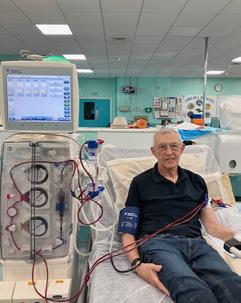

The NKF continues to campaign actively for improved renal care as Secretariat for the All-Party Parliamentary Kidney Group, chaired by Jo White, Bassetlaw MP, keeping kidney disease high on the Government’s agenda. (See more about the APPKG and the recent summit on page 14).
"I am very pleased that the National Kidney Federation, based in my constituency, are to be awarded £19,019 in National Lottery funding. The NKF do a vital job of work in campaigning for improvements to renal provision and treatment. As Chair of the All-Party Parliamentary Kidney Group, I will continue to work with the NKF and the Government to ensure that treating kidney disease remains a priority."
Jo White, Bassetlaw MP
This important funding comes from National Lottery players, who contribute over £30 million weekly to good causes across the UK. More information can be found at www.TNLCommunityFund.org.uk
Come together with us this October for an unforgettable event. Don’t miss your chance to be part of the experience – inspiration, connection and celebration!
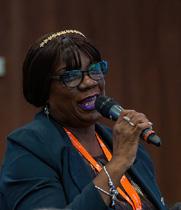
The National Kidney Federation’s Annual Event is taking place on the 11th and 12th October 2025 at the Hilton Hotel near East Midlands Airport, DE74 2YZ.
Whether you’re a patient, family
member, or health professional, this event has something for everyone.
The event will be jam packed with educational and lived-experience sessions, up to date research, and an interactive exhibition hall showcasing the latest in renal care technology and support resources.
The Annual Event isn’t just a conference – it’s a community celebration sharing progress, knowledge, support and shared experiences. Everyone is very welcome.
The event will start with a relaxed social evening, featuring a delicious 2-course buffet and a fun quiz. Please note: If you book a stay at the hotel for the Saturday evening, you will enjoy a complimentary buffet.
LOW ROOM AVAILABILITY BOOK NOW
Our main event will be a full day packed with inspiring speaker sessions, Q&A session, and an exhibition showcasing the latest in kidney care. For more information on our speakers, please visit our website.
Our event programme for the weekend includes sessions on:
• Making the Most of Your New Kidney
• Collaborative Working to Improve Dialysis Patient Outcomes
• Living Donorship
• The Lows and Highs of Dialysis as a Young Adult
• Renal Dietician
• IgA Nephropathy & Vifor’s Patient Campaign
• The Role of the Paediatric Renal Social Worker
• Frailty and Fatigue
• Home Dialysis and Peer Support
There will also be time built in to the programme for questions from the audience. Full programme with confirmed speakers will be on the NKF website shortly at: www.kidney.org.uk/Event/nkf-annual-event-2025
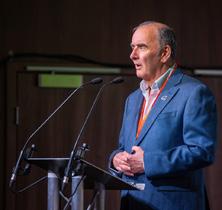

Registration is now open, and we encourage you to secure your spot early to ensure you don't miss out on this great event! Book now
Sat 11th October – Sun 12th October
Hilton Hotel – East Midlands Airport
SOCIAL EVENING WITH TWO COURSE BUFFET

This is FREE for anyone staying at the Hotel on the Saturday evening. Please book your free buffet when you book your day delegate place by calling the NKF office on 01909 544999 or via this link: www.kidney.org.uk/nkf-annual-event-2025
HILTON HOTEL ACCOMMODATION LIMITED AVAILABILITY – BOOK NOW
£110 single bed and breakfast, £120 double/twin bed and breakfast (offer includes car parking and VAT). Please note accommodation needs to be booked directly with the Hilton Hotel not via the NKF office, please use this link: www.hilton.com/en/attend-my-event/ emahnhn-91m-45896dc3-5095-4cd5-a177-78409d619271/
If you would like to stay over on the Sunday evening too, this special rate will also apply.
MAIN EVENT DAY DELEGATE RATE
£55 per person
NKF Members SAVE 10% on the day delegate rate, please call the NKF office (01909 544 999) and state your membership number for your discounted rate. To learn more or to become an NKF Member visit: www.kidney.org.uk/member
If you would like to book your buffet and day delegate place you can do so here: www.kidney.org.uk/nkf-annual-event-2025
If you wish to book your places over the telephone, please call 01909 544999.
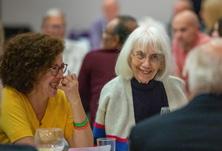
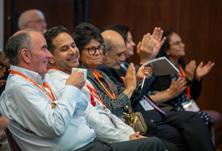
Hot buffet & quiz sponsored by Stanningley Pharma
Main event & exhibition sponsored by CSL Vifor and Novartis








In this life-affirming story Nicola Hilton describes her experience of living with Fanconi’s Syndrome – a rare condition affecting how her kidneys reabsorb certain essential substances which can be hereditary or acquired. Nicola tells her story in her own words.
My story begins when I was just 10. A healthy and active child into dance, gymnastics and swimming my legs started to hurt. This pain however seemed unsurprising given how active I was and my age, and so after a check in with the GP, the answer was that I simply had growing pains.
However, these ‘growing pains’ didn’t let up, in fact they got worse. I was referred to a paediatrician. I had x-rays, blood tests, a muscle biopsy and nerve tests which sent electric shocks through me, but nothing gave an answer as to why I was in so much pain. One doctor even wondered if it was ‘a habit’ I had developed, and there was in fact nothing to diagnose. Now age 12, I could barely move for the pain and my knees were beginning to bow.
A fateful accident on a school trip finally gave us answers. I took a simple fall, probably because of the extreme difficulty I now had moving, and I went to a local hospital where they x-rayed my leg to check for injury. It had been two years since my last x-ray, they had x-rayed them once, declared them clear and never x-rayed me again. This time was different, the doctor looked at the x-ray and then suddenly looked back at me and asked the question “do your legs hurt?”
It was finally there, literally in black and white, clear to this doctor in just one look - I had rickets. Renal rickets, due to undiagnosed kidney disease. The role kidneys can have on bone health was unknown to us; this was a shock. I had painful legs, but this was because of my kidneys?
Rickets was almost unheard of and was traditionally thought of as a Victorian disease and mostly extinct now. This rarity was the reason given why my first x-rays “hadn’t seen it’”, even though we were told later it was clear even then.
At Great Ormond Street I was diagnosed with Fanconi’s Syndrome, a renal disease and the cause of the rickets. My kidneys had been kicking out all of my vitamins and nutrients rather than absorbing them and so my bones were not receiving any nutrients. Silently doing this for years, this led to the onset of rickets, the weakening and deformation of bones due to lack of vitamin D.
The diagnosis was actually a relief. The two long years of highly unpleasant tests and going undiagnosed, questioning myself and my symptoms, then finally validation and a solution. To know my pain was real and

solvable was a relief. Suddenly it was no wonder my legs hurt.
The prognosis of Fanconi’s Syndrome however was a grey one. It was described as ‘ultra-rare’. I may as well have been a unicorn! I was a medical fascination, most clinicians had never met someone with Fanconi’s, and so my treatment and future were somewhat undiscovered. No one in my family had it, so it couldn’t be genetic and I was simply an unfortunate one-off. We learnt that it meant treatment for life, and eventual kidney failure. It wasn’t a question of if, it was when.
Fast forward through the years and with treatment I remained well. I went to university and gained an undergraduate and master’s degree. I was lucky to have two beautiful daughters – Flossie and Emilie - largely without issues from my kidneys, and I married in 2015. Alongside this I carved out a successful career working in data and analytics, becoming a senior manager in the NHS.
My kidneys eventually failed in 2019, and at the end of that year I went on to have my transplant through the paired exchange scheme, gifted by my brother with another pair in the North. Post transplant came Covid and shielding, but I felt lucky to have had my transplant, recovering comfortably with my family. I returned to work, working from home and we enjoyed activities like walking our dog in quiet fields through the 2020 summer.
It was after those dog walks however that my then 10-year-old, Emilie, suddenly started saying to me a familiar phrase “Mummy, my legs hurt …” suddenly a stark echo back to my childhood.
"But it's not genetic" - or so I'd been told. But this was a rare disease, could they even be certain?
I felt like a neurotic mother in that first GP appointment with Emilie, first describing my own condition to the unfamiliar GP, followed by Emilie’s then currently vague symptoms.
The path which followed was unfortunately slow, it wasn’t considered urgent during a pandemic, but we had a referral to a local paediatric unit and some basic tests. Her bloods showed borderline levels of low nutrients and a reduced kidney function. The doctor said this was “unusual” for a 10-year-old but felt she could “keep an eye on it”. At this point I pushed, we had already waited six months, and Emilie’s pain was increasing. I suddenly had a feeling. I wasn’t prepared to let history repeat itself.

genetic disease is much more than the gift of a kidney. Having a rare condition can be such a lonely reality, the delayed diagnosis, the lack of people you can compare with, the times you need to explain and excuse yourself because of symptoms and challenges, the undiscovered treatments and unsure future. This I understood. This was my offer.
The results were sent to Southampton Hospital for review by a specialist paediatric renal professor. Within hours he rang me directly and asked Emilie to be admitted straight awayagain in black and white, the diagnosis was clear to him, she needed urgent treatment - she had Fanconi’s too.
I looked back, in all my years of life, I thought I had never met anyone with Fanconi’s before. Little did I know, I had, all this time, that little one person living with me. Two unicorns together.
Treatment plans followed. It was all so familiar to me with the same medications, regime and long-term prognosis. Emilie would one day have kidney failure, again not if, but when. Genetic testing followed and it was confirmed; there was a genetic family gene mutation.
This led to probably one of the hardest realities of Fanconi’s I have had to face. It is one thing to be in control of one’s own condition, how you react and manage it. Suddenly I had to watch my child go through it, and I felt like it was my fault, I had given her this. And critically, the one thing she would one day need to make her better, a kidney, I would not be able to give her.
Time, however, brings perspective and I realise now it is not as clear-cut as this. I recognise this link of our
Today, Emilie now 15, is reaching her final years of school. She sings and has a passion for musical theatre. She’s a talented performer. She loves spending time with her friends and summer evenings on the beach. I am approaching six years with my transplant, an active mum to both my daughters, I continue to work in the NHS leading an intelligence team, and I enjoy spending time outdoors and sea swimming with our cockapoo, Martha.
It would be remiss to say there are no challenges for both of us, but I hope I offer comfort whilst living with a rare kidney disease there is still life we can create for ourselves.
So this is what I take as my alternative gift to Emilie as she walks this path as I did, to be her advocate, ally, and example, that whilst we are both unicorns – we’ve got this.


A huge shout out to the 16 amazing employees from enfinium for their fantastic fundraising support for the NKF. The team included Andrea Brown, NKF’s Chief Executive’s husband Gary and they recently took on the epic Total Warrior Challenge.
On the weekend of 21st June, the team battled through a tough 12km obstacle course in Leeds and took on the fiery heat of the ‘Human BBQ’, the freezing waters of ‘The Plunge’ and the electric finale of ‘The Shocker’. This challenge was no walk in the park!
The team, all part of enfinium Ferrybridge 2 site, showed massive determination to complete the course.
enfinium converts non-recyclable waste into heat and renewable power, and the team took on the challenge like champions, clearly knowing a thing or two about turning up the heat on and off the job.
Thanks to every muddy hurdle and freezing dip, the team has raised over £15,000! An amazing result!
Jordan Pepworth, Maintenance Manager at enfinium Ferrybridge 2 and participant, said: “We want to express our gratitude to everyone who has donated so far and for the overwhelming support we received from across the company and the wider community. It is a privilege to be able to raise vital funds for the National Kidney Federation, an organisation that carries out such important work.”
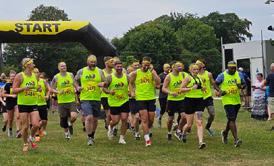

The Total Warrior Challenge showed just how much can be achieved when people come together and give it their all.
Andrea Brown, Chief Executive of the National Kidney Federation, said of Team enfinium’s efforts, “We’re really proud of Team enfinium going all in. Their efforts not only help fund life changing services for kidney patients and their families but also highlight the need for more awareness and support around kidney health. We are very grateful for their amazing support.”
Donations can still be made through Team enfinium’s JustGiving page: www.justgiving.com/campaign/ enfinium-total-warrior-2025


A MANIFESTO FOR INCREASING HOME DIALYSIS IN ENGLAND FOR THE BENEFIT OF PATIENTS AND THE NHS

Report & Recommendations to the Secretary of State for Health and Social Care, the NHS and the Kidney Charities following the Home Dialysis Summit hosted by the All-Party Parliamentary Kidney Group
www.kidney.org.uk/home-dialysis-campaign-manifesto
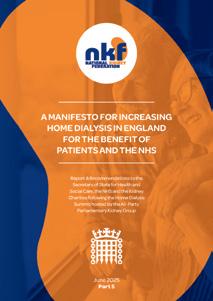



The NKF provides a series of webinars for patients, carers, family members and professionals every year. The webinars are very popular and joining in is a great way to keep up to date with the latest thinking, research and practical support available.
The next webinar is detailed here, visit the below link or scan the QR code to go to the online booking form to register your free place.
COVID-19 and Kidney Disease - What You Need to Know 5 Years Later Wednesday 24th September at 5pm
Dr. Hellena Habte-Asres Lead Clinical Academic Research Nurse in Diabetes & Chronic Kidney Disease (CKD) at Royal Free London NHS Foundation Trust and a guest patient speaker will present a webinar on the impact of COVID-19 on people with CKD, what we know now and how to live well with CKD in the post-pandemic world.
To register for the event please visit: www.kidney.org.uk/Event/nkf-webinar-series


A heartfelt thank you to everyone who took part in this year’s Best Foot Forward walking challenge. Your enthusiasm, dedication, and generosity have made this one of our most successful years yet – we are truly blown away by the support. A truly amazing £20,000 has been raised by our walkers this year for which we are very grateful. Every £ helps us provide continued and expanding support for people living with kidney disease. Thank you!
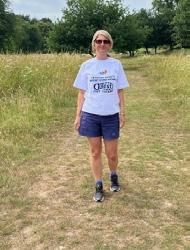


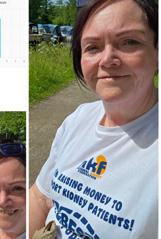



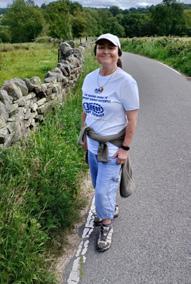

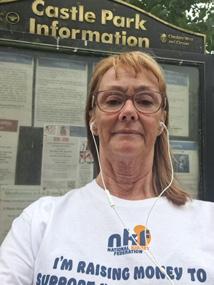

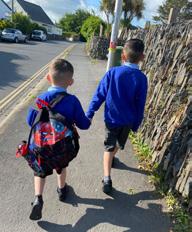


Surjit Bhalla recently took on the National Kidney Federation’s Best Foot Forward Challenge, a sponsored walk during June raising much needed funds. Here he shares his journey living with kidney disease and his long-standing commitment to fundraising for charity. Through his efforts Surjit aims to increase awareness of kidney disease and to demonstrate his dedication in supporting hospitals and charitable organisations.
“I was born in Kenya, and ‘boys being boys’ we used to play in the river while going to school. It wasn’t until 1984 that we discovered that I had caught a bug called Bilharzia (from dirty water) which gave me cirrhosis of the liver. It was in March 1984 when I was having lunch at Café Royal near Piccadilly Circus in London, that I was suddenly taken ill, when I vomited lots of blood. I was in intensive care for about four weeks. It was then that the doctor discovered that I had cirrhosis of the liver.
Since the liver was not functioning all that well, the doctors put me on diuretics to help the kidneys pass out water. This went on for 25 years, and then my kidneys failed. In January 2010, I had a liver and kidney transplant. This was very successful and I enjoyed 15 years of carefree health.
Then in June last year my kidneys showed signs of failing. The doctors tried to tweak my medicines but unfortunately nothing worked satisfactorily and in November last year I started regular dialysis.
I started dialysing at Hammersmith Hospital in the evening. As the evening session did not suit me I requested morning sessions. I was then sent to Saint Charles Hospital, but I ended up having to go to Charing Cross Hospital as an emergency patient under the blue light!
Having recovered, I then requested a change of hospital, I was then transferred to my current centre, Northwick Park Hospital. I get excellent service there; the nurses and the rest of the staff are extremely professional and caring.
Just to give you a little bit more background about myself, I have always been proactive in supporting charities and I have done lots of charity walks for King’s College Hospital, where I had my transplant.
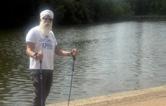

My very first sponsored walk to raise funds for the King’s College Hospital Transplant Unit was to walk across 10 London bridges. That was in July 2010 and I raised £6,666.66. Having done a few other small walks, I managed to go to Tibet and trek across Mount Kalash and raise £8,888.88 with the help of my very generous friends and family.
My aim is to continue regularly raising funds as long as my health permits.
I took part in the Best Foot Forward Challenge this year to support the National Kidney Federation charity and I covered over 200,991 steps!”
Surjit has raised over an incredible £2,000 for the National Kidney Federation for which we are very grateful. Well done Surjit!
For those inspired by Surjit’s story and interested in contributing, donations can still be made through Surjit’s JustGiving page: www.justgiving.com/page/dr-surjit-singh-bhalla-4

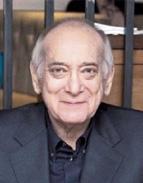
The idea to create the David Myers award came from Martha Myers, David’s widow. David, who died last year, had been a kidney transplant recipient twice over and spent more than 30 years as a renal patient of the Royal Free London (RFL). David was awarded the British Empire Medal in the Queen’s Birthday Honours List in June 2021 for services to renal patients. He campaigned tirelessly on behalf of RFL patients, helping to lead the charge locally to raise awareness of organ donation, especially among ethnic minority groups.
Alba Gaughan, an assistant phlebotomist at Edgware Kidney Care Centre, has become the first recipient of the Award for Excellence in Kidney Care for consistently going above and beyond for her patients and being nominated by them.
Alba has worked at the RFL for 24 years and told assembled guests at the event when she received the award that she was “humbled and grateful” to receive it. Alba said: “This award motivates me to work even harder because of the impact I know it has on patients’ lives.”
The award was presented to Alba at the end of an evening where David’s work as part of the Royal Free Hospital Kidney Patients’ Association (RFHKPA) and his three terms as hospital governor was celebrated. From championing patient representation on committees related to their care, improving patient transport, putting in successful grant bids for education events, fundraising for equipment, as well as ensuring renal dialysis centres remain at the heart of communities, David’s legacy lives on.
Dr Mark Jesky, consultant nephrologist and service lead, reminded the 100-strong audience who gathered on World Kidney Day, that they should never lose sight of the people behind every kidney disease statistic. Caryl Bryant, of the RFHKPA, outlined the KPA’s role and the major part that David played in its continuing development and success.
Speakers included Professor David Wheeler who discussed the management of chronic kidney disease and the new treatments currently available and on the horizon. Professor Danny Gale also shared how patient data is being used in the fight against kidney disease.
Kirit Modi MBE, Honorary President of the NKF, spoke about his friendship with David and the work they had done together on encouraging organ donation.
“David and I were kindred spirits. We were both extremely fortunate to receive two kidney transplants. We received one living kidney because our wives made amazing decisions to give an invaluable gift, and the other kidney was from the national pool of anonymous donors after they passed away. David was highly respected by patients as well as staff in the hospital, and his leadership was recognised nationally. He increased the profile of the kidney patients’ association by increasing its membership, establishing a website, publishing a newsletter, and making patient transport service more accountable.”
Transplant patient and NKF Peer Supporter, Patricia Gooden, took part in a transplant discussion.. The focus was on enabling patients to live their very best lives and Patricia shared how she refused to let her condition stop her from her great love of travel and her commitment to the RFHKPA.
Nii Plange, chairman of the RFHKPA, spoke of David’s unwavering dedication and compassionate heart. He said: “I’m full of gratitude for the time we had together and though I wish we’d had more time I’m comforted by the memories we created. Thank you David for showing us the way.”
Going forward the award will continue to be presented annually to a member of staff from the RFL renal service who goes above and beyond. The award will be displayed in the RFH’s renal unit.
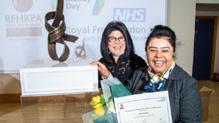
Bookdialysis.com opens up a world of possibilities for those who require regular treatments to maintain their health. No longer confined to their local dialysis center, travellers can now plan vacations, business trips, and adventures without worrying about compromising their health care needs. Through a simple 3 steps process, travellers can find clinics at their destination, see real availability of slots and book their treatments, everything for free.
With a network of more than 820 clinics in 50 countries and 370 cities, bookdialysis has transformed the way individuals with kidney disease approach travel, offering newfound freedom, flexibility, and opportunities for exploration. With direct access to dialysis clinics, and a supportive community, CKD travellers can now embark on adventures with confidence, knowing that their health needs will be met wherever their travels may take them. So, whether it's a cross-country road trip, an exotic international getaway, or a weekend retreat in the mountains, bookdialysis enables individuals to embrace the world without boundaries. Find out more at www.bookdialysis.com



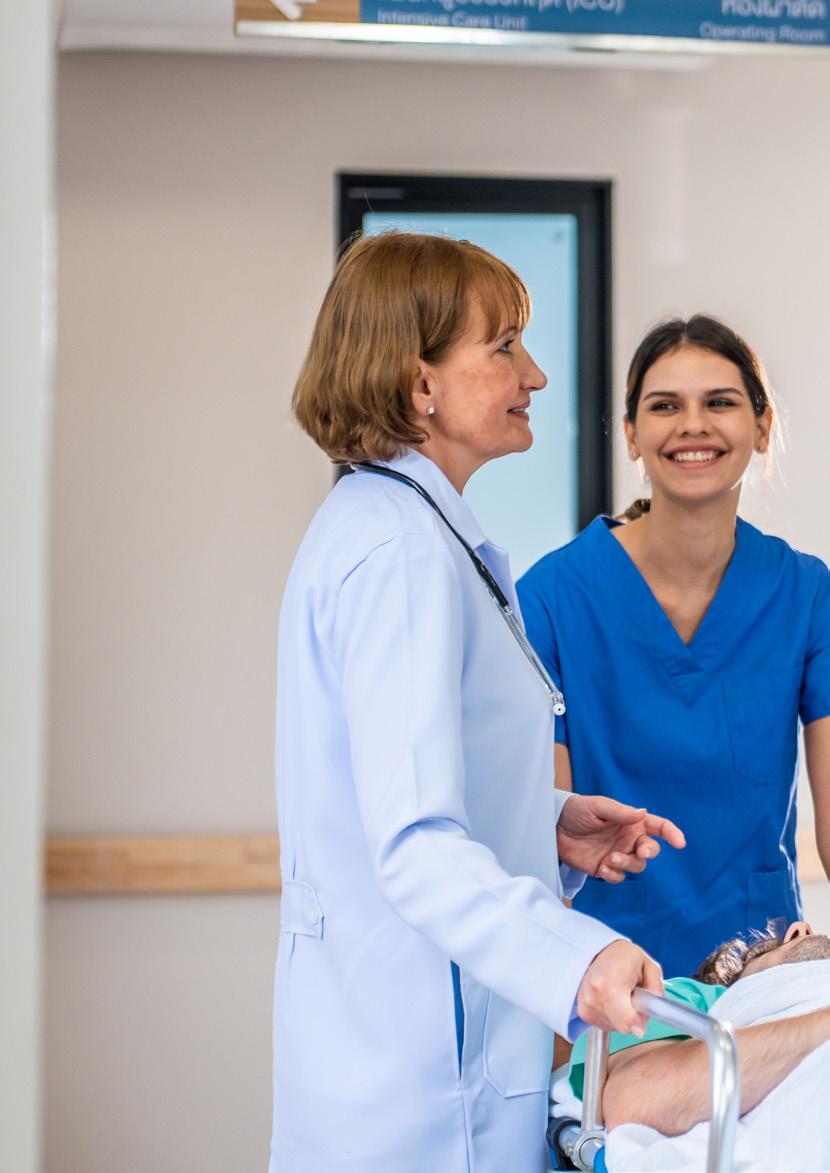
As the NHS embarks on its ambitious 10-Year Health Plan, the National Kidney Federation (NKF) has been working tirelessly to ensure kidney patients' voices are heard and their needs prioritised. Our recent advocacy efforts have focused on several critical areas that will shape the future of kidney care in the UK.
We cannot discuss the 10-Year Health Plan without raising that NHS England's planned merger with the Department for Health and Social Care (DHSC) along with significant changes to the functions of Integrated Care Boards (ICBs) marks a major healthcare restructuring. The NKF is monitoring how these changes will impact kidney patients' specialist care access and treatment continuity. We're engaging with policymakers to ensure reorganisation strengthens kidney care. Further to this, the Spring Statement's welfare reforms proposed restrictions to PIP eligibility and freeze Universal Credit health top-ups - critical supports for kidney patients managing dialysis, transplants, and chronic kidney disease. The NKF joined Scope and 45+ charities in addressing the Chancellor about how these changes could push 700,000 more disabled households into poverty. We participated in the public consultation to ensure kidney patients' unique needs are represented.
Announcements early in July saw significant changes to the initial proposals made in the reforms and NKF will be reviewing progress on the welfare bill, as it progresses through the House of Commons, for further opportunities to advocate for the needs of kidney patients.
Our Home Dialysis Campaign, launched in the wake of the COVID-19 pandemic, concluded in May 2025 with the All-Party Parliamentary Kidney Group Summit held in Parliament to launch a Manifesto for increasing access to home dialysis in England. The Manifesto will form the foundation of our advocacy work and makes several recommendations to government departments, Regional Kidney Networks and ICBs, as well as charities from across the sector.
The Manifesto uses data published by the UK Renal Registry that demonstrated patients who dialysed at home were significantly better protected from COVID-19, with infection rates of just 5.3% compared to 15% for in-centre haemodialysis patients.
Moving beyond pandemic protection, home dialysis offers patients greater independence, flexibility, and control over their treatment. As one patient shared with us, 'Home dialysis has allowed me to dialyse to live, not live to dialyse.' This powerful testimony underscores why we continue to push for expanded access to home therapies. Please see our website for the full Manifesto for increasing home dialysis in England: kidney.org.uk/homedialysis-campaign-manifesto

The NKF has recently submitted a formal response to the 2025/26 NHS Payment Scheme consultation, raising significant concerns about elements that could impact kidney patients' access to care and treatment options.
We specifically raised concerns about how hospitals are financially rewarded for providing different types of kidney care. Currently, the NHS payment system doesn't offer financial incentives for peritoneal dialysis (a type of home dialysis where fluid is passed into the stomach to filter waste products from the blood). This means hospitals may have less financial motivation to offer this treatment option to patients, despite it being ideal for many people.
This approach goes against the NHS's own "Getting It Right First Time" recommendations, which clearly state that all types of dialysis should be supported, with a particular focus on treatment that can be done at home. Without equal financial support for all treatment options, hospitals might be financially pressured to guide patients toward in-centre dialysis rather than discussing the full range of options that might better suit their lifestyle and medical needs.
Our concerns extend to the proposed payment limits for activity-based services, which could potentially impact the flexibility needed for dialysis services, particularly regarding Dialysis Away from Base—an essential service for patients' quality of life, enabling them to maintain employment, family connections, and mental wellbeing through travel and holidays.
As the NHS introduces 'neighbourhood health' services, the NKF has been actively involved in helping kidney patients and Kidney Patient Associations (KPAs) understand and influence these Integrated Neighbourhood Delivery Plans.
These plans represent a crucial opportunity to shape how services will work together, how money will flow between NHS and council services, and how staff will be trained and organised. For kidney patients, these decisions could significantly impact access to specialist services, support for home dialysis, and coordination between different healthcare providers. We've developed resources, including template letters and briefing materials, to help KPAs and individual patients engage effectively with their local ICBs. This grassroots advocacy is essential as the NHS faces challenging budget constraints.
The government's 10-Year Health Plan aims to reform the health system around three transformational shifts: from treating sickness to preventing illness; from hospitalbased care to community and primary care delivery; and digital transformation of service delivery.
These shifts align well with the needs of kidney patients, particularly the emphasis on care closer to home and prevention. Home dialysis represents exactly the kind of hospital-to-home shift that the plan advocates, while early intervention in kidney disease can significantly delay or prevent the need for dialysis altogether. The plan commits to developing modern service frameworks with early priorities to include cardiovascular disease. NKF, along with other charities are working to highlight the need for a framework for chronic kidney disease and keep kidney care high up the agenda as a priority for improving healthcare.
The NKF is working to ensure that these broader system changes benefit, rather than disadvantage, those with kidney disease.
As the detail of the NHS 10-Year Health Plan takes shape, the NKF is focused on ensuring it addresses several key priorities for kidney patients:
1 Protection of specialist kidney services, ensuring that multidisciplinary teams including specialist nurses, dietitians, renal social workers, and psychology support services are maintained despite budget pressures.
2 Equitable access to home dialysis, with targeted support for patients from deprived areas and ethnic minority communities who currently face barriers to accessing this beneficial treatment option.
3 Integrated care pathways that ensure seamless coordination between kidney specialists, GPs, mental health services, and social care.
4 Digital inclusion that supports patients using NHS digital services while providing alternatives for those who struggle with technology access.
5 Sustainable funding models that recognise the long-term cost-effectiveness of home dialysis and preventative care for kidney patients.
With chronic kidney disease affecting more than 10% of the UK population and becoming increasingly common as our population ages, the NKF's advocacy work has never been more important. By ensuring kidney patients' needs are reflected in the NHS 10-Year Health Plan, we can work towards a future where everyone with kidney disease receives the best possible care, regardless of their background or circumstances.

For more information on the National Kidney Federation's work or to get involved with our campaigns, please visit www.kidney.org.uk or contact nkf@kidney.org.uk

When Mahesh Mehta first began dialysis at the age of 18, he never imagined he would still be doing it half a century later. But 50 years on, Mahesh isn’t just continuing –he’s looking for a second world record.
Back in 2017, Mahesh made headlines for holding the Guinness World Record for the longest time spent on dialysis: an astonishing 42 years. Eight years on he’s reached an even more incredible milestone – 50 years of treatment – and he looks set to reclaim his title.
Mahesh, from Stanmore, began dialysing in early 1975 at St Mary’s Hospital in London. “Things were very different back then,” he recalls. “Each session could last nine or ten hours, and I was going three times a week. The diet was strict – very low potassium, very low protein. It was tough.”
Despite two kidney transplant attempts - one in 1979 and another in 1990 - neither was successful. Before the first transplant Mahesh undertook training to become a lab technician at the hospital but following his first transplant he was too ill to take up his post. He did however edit the newsletter for St Mary’s Hospital for ten years.
After the second transplant failed Mahesh made the decision not to pursue further transplants. He continued dialysing at home for many years, until arthritis in his hands made the process too difficult. Since 2004, he’s been back at Northwick Park, now receiving shorter, more comfortable three-hour sessions three times a week.
In 2014, Mahesh lost his sight and he now uses a wheelchair, but his outlook remains cheery. “Of course, there have been difficult times,” he admits, “but I try to look back with humour and a light heart. Since losing my sight music therapy has helped me a lot. I still listen to The Carpenters and ABBA - ‘The Winner Takes It All’ is my favourite.” Mahesh now spends his time listening to TV and radio – as well as music he enjoys quiz shows and old comedies on Radio 4 Extra.
Mahesh is full of gratitude for the people who have supported him, especially his mother, Bhanumati, now nearly 90 years old and still his carer, despite her own battle with cancer. Sadly Mahesh’s father Sukhdev passed away in 2011. However, Mahesh’s sister, Rekha Thaker and her family also play a vital role in his day-today life, and Mahesh is endlessly thankful for their love and support.
He also speaks fondly of the many healthcare professionals who’ve cared for him over the decades: “The doctors and nurses at Northwick Park have been brilliant. I’ve got to know so many of them over the yearsthey’ve really helped me keep going.”
Over the years Mahesh has managed to take a number of holidays with trips to Sussex (making use of the KPA accommodation), Majorca, Jersey and a trip to stay with family in Canada for which he took a portable dialysis machine.
Now, as Mahesh reaches his golden milestone of 50 years on dialysis, he’s not just defying the odds - he’s setting a new standard for resilience and hope. Mahesh’s niece Sharmee Di Pinto is investigating the possibility of another Guinness World Record – there could soon be a very good reason to celebrate.

Mahesh’s message is an encouraging one: “You can carry on!”
After 50 years on dialysis Mahesh has calculated that he has dialysed over 8,000 times, lasting more than 30,000 hours, filtering 500,000 litres of his blood.
Watch this space – Mahesh Mehta is still going strong. As he says, “Fifty not out!"
Editor's note: We will of course let readers know if Mahesh is a record breaker for a second time.
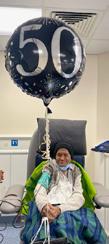
Mahesh celebrating his 50th dialysis anniversary at St Mark's Hospital with family and staff








































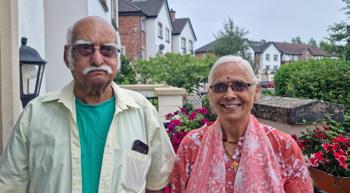
Continuing the theme of dialysing while travelling, this is the story of retired consultant, Dr Rao Madhavapeddy from Belfast and his experience over the years.
This is my experience with dialysis so far. I started on haemodialysis in April 2022 when conservative treatment failed. I had gained weight due to water loading which resulted in a pleural effusion. Haemodialysis was started on the existing shunt in my left arm and all went well for two months. I then had to have shunt dilation by the interventional radiologist and in a short span of time two clot removals were undertaken by the same team.
During this time I had an abdominal peritoneal dialysis (APD) catheter inserted. This was my first choice. When my shunt got blocked, APD was started as an emergency, instead of the originally planned transition. My wife and I undertook a two week intensive training course from Sister Marie Fuller, in Ulster Hospital where we learned about the machine, its alarms, various fluids, connections in detail. During this time the APD continued with the helping hand of extra care staff, who are all well trained and who deliver selfless service throughout the year.
In the beginning Denise, a senior extra care worker was very patient explaining every aspect. After training with Sister Fuller, my wife became confident in the practicalities with the assistance of the social worker.
After 18 months of APD at home, we thought we should take a short holiday to England to see how things would work out. With the help of Sister Fuller and the City Hospital pharmacy, who supply all material bi weekly, we planned to visit Cambridge, where our son works. We gave the dates to pharmacy two weeks before we travelled and they arranged delivery of fluids two days before our arrival in Cambridge.
The next dilemma was wondering if there would be a problem with the airline as we would be taking the APD machine with us. We corresponded with EasyJet and they gave us a positive reply. So with the email copy and a letter from the hospital about the need for us to take the machine, we went to check in at Belfast airport. We told the staff about the dialysis machine, and they simply booked it without including it in baggage allowance. No one asked for proof.
So we reached Cambridge and our son made sure we were not disturbed during dialysis timings. We had a great time and after a week’s break returned home to Belfast. Sister Fuller was waiting at our home and helped us setup the machine and connect fluids.
This trip away from home gave us the confidence to plan a trip to India. But we were worried about possible problems. What would happen if the machine didn’t work properly? What would we do in the event of electricity failure? Would the materials from Baxter be delivered in time for our arrival? We knew there are good facilities for haemodialysis in India, but we didn’t know the status of APD. After making enquiries we found there is a multispecialty hospital near my house which supervises APD patients.
The next worry was whether the airline would accept the machine for transport and what would we do if the machine was lost or delayed during travel. So I contacted the Baxter representative to ask about hiring a similar machine as a backup. After a lot of effort I secured a rented machine. After going through all options I finally settled for higher UPS battery backup which was actually very useful as short current failure occurred three times during the dialysis but worked on silently.
We gave our dates of departure and return to Sister Fuller and pharmacy and they made all the arrangements for delivery of fluids, drainage bags and minicams to the given address. Everything was delivered five days before our arrival in India. We flew with British Airways non-stop to Hyderabad to avoid stopovers which would increase the chance of delayed or lost luggage during transit.
During check-in, British Airways accepted both the machine and accessories suitcase without any problem and outside our luggage allowance. After landing in Hyderabad we took a taxi straight to my home, a journey of about five hours. As soon as we reached home, the machine was set up and the satellite link connected immediately. For the whole four weeks the machine worked perfectly, even during current failures of 10 minutes, so the UPS was a worthwhile investment.

I think it’s a learning curve for all of us in dealing with the various aspects that make travel successful and enjoyable. We are looking forward to another holiday to India soon!!
For a trip to India there are a few things to remember:
1 Baxter supplies fluids to all the states except Kerala
2 APD facilities are limited with no home help to setup the machine every day. Your partner should be trained
3 For HD many dialysis centres are available
4 APD fluids supplied are 2.5% & 1.5%
5 Baxter don’t supply patient extension leads, shields, or Y manifest connections
6 You can rent an APD machine from Baxter for Rs.12,500/pm, but it is an elaborate procedure taking 4 to 6 weeks needing co-operation from a nephrologist.
Happy travels!


Inside this edition of Kidney Life, you’ll find three books of draw tickets for our everpopular Christmas Draw, with a fantastic top prize of £1,500.
You can return your completed stubs in the pre-paid envelope with a cheque, or simply purchase tickets online at: www.kidney.org.uk/shop
Thank you! Fundraisers like you are vital to help us continue to provide crucial services to kidney patients and their families. Good luck!


Also included in this edition is our festive Christmas Brochure, filled with wonderful seasonal items:
• Christmas cards • Gift wrap & money wallets • Reindeer food
• Grow-your-own Christmas trees
Order by post using the brochure, or shop online at: www.kidney.org.uk/shop
NKF Members receive 10% off all webshop purchases!
Not a member yet? Join us at: www.kidney.org.uk
It’s never too early to get organised – our 2026 NKF Calendar is available now for just £5!

This is a special renal cartoon calendar, each cartoon was drawn by the late Pete Quaife who was a founding member of the 60’s band The Kinks, he battled kidney disease for many years but always saw the lighter side of CKD.
Perfect for noting down important appointments, birthdays, and special occasions, each month features a beautiful, seasonal photo that’s sure to brighten your wall all year round. Order yours today while stocks last!
Online: www.kidney.org.uk/shop By phone: 01909 544999
Start the year ahead with NKF – practical, inspiring, and supporting a great cause.
This Wordsearch is all about fundraising. Times are challenging for charities at the moment and the NKF is no different. But there’s lots going on to raise much needed funds. Some of these activities appear in the magazine and some are taken from the NKF’s website.
BEST FOOT FORWARD
WARRIORS SKYDIVE CALENDAR COFFEE
MORNING MEMBERSHIP
MARATHON
LOTTERY
INFLATABLES DRAW
TREKKING
SPONSOR
DONATION

If like me you’re having a bumper crop of courgettes in your garden this year due to the sunshine and far fewer slugs than normal, then this recipe is great! It’s quite a light dish – we ate it with chicken and the mint and parmesan make it quite zingy and fresh. Here’s my version and yes, we did go a bit mad with the parmesan! Enjoy…. Ed
600g courgettes
160g frozen peas
1 garlic clove, finely grated or crushed
4 egg yolks
50ml whipping cream
Method
20g parmesan, finely grated
Freshly ground black pepper
40g rocket
3 tbsp finely shredded mint leaves
1. If you have a spiraliser, run the courgettes through it to form long ribbons, otherwise, grate lengthways on a coarse grater to get as long a piece as possible.
2. Place the courgettes into a saucepan. Add enough cold water to cover, then set over a high heat and bring to the boil. When boiling, turn the heat down and simmer for 2 minutes until just tender then add the peas and cook for 1 more minute.
3. Meanwhile, tip the garlic, egg yolk, cream and ¾ of the

Ready in 15 mins
Serves 4
parmesan into a bowl with plenty of black pepper and whisk together.
4. Drain the courgettes and peas and tip back into the saucepan then pour the parmesan mixture over the top straight-away and toss really quickly to coat the courgette in sauce.
5. Add the rocket and mint leaves and toss once more – the eggs want to just cook in the heat of the courgettes, but not curdle.
6. Divide between serving plates and scatter the rest of the parmesan over the top with some more black pepper.

https://bit.ly/nkfmembership

From just £3 a month—you can join the NKF community. Your membership will help us continue providing essential support to kidney patients and their families across the UK. Join the NKF Community and Make a Difference.
You'll get a 10% off voucher to spend on our online shop. Plus, exclusive member discount days.
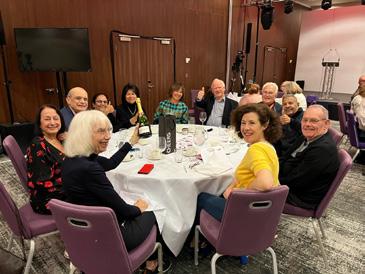
Be the first to know about upcoming sales, events, and more...



Together we’re stronger. Help us recognise and support local voices. J O I N N O W !
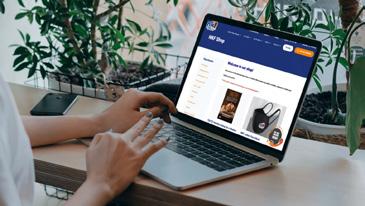
You'll receive exclusive invites to our NKF special events. Plus, exclusive discounted rates to our Annual NKF Event.
Our Helpline is a lifeline -Help us answer more calls for support.
Your knowledge is power - Help us to empower patients and be in control of their health choices.

Let’s shape futures together. Help us to raise big kidney challenges and voice real solutions in Parliament.
Together, we can bring hope and support to kidney patients and their families across the UK. Join now https://bit.ly/nkfmembership
Your contribution makes a real difference in the lives of kidney patients across the UK
Please
Please
Please complete this form and return it to: National Kidney Federation, The Point, Coach Road, Shireoaks, Worksop, Nottinghamshire, S81
Address:
If you would like to become a member over the phone, please call
or alternatively visit: www.kidney.org.uk/donate/membership
or alternatively visit: www.kidney.org.uk/donate/membership
544




